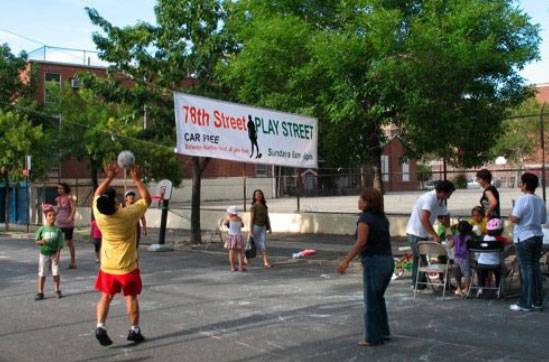Report: New Yorkers Like Ped Streets More Than They Expected
 Enjoying a game of four-square out on the street in Jackson Heights. Photo: Transportation Alternatives.
Enjoying a game of four-square out on the street in Jackson Heights. Photo: Transportation Alternatives.In addition to last summer’s blockbuster car-free event, Summer Streets, three New York neighborhoods tried out pedestrian streets on a more intimate scale. Williamsburg Walks, Summer Space in Brooklyn Heights, and the 78th Street Play Street in Jackson Heights gave communities a taste of how streets function as public spaces when cars aren’t clogging up the curb or barreling down the road. Get ready for more this year: About ten neighborhoods are applying to put on pedestrian streets in the summer.
Using surveys and other data collected before and after last year’s car-free events, Transportation Alternatives sheds some light on the upward trend in their new report, "I Walk in My Street" [PDF]. Here are some of the notable findings reported by TA:
- Before Summer Space, only 42% of respondents said they would visit Montague Street more often if it were closed to auto traffic; during the closure this number jumped to 72%.
- The percentage of respondents who rated the pedestrian experience of Montague Street as “Good” or “Very Good” increased from 79% before the closure to 97% during the events.
- 100% of those surveyed at the 78th Street Play Street felt that the event “enhanced the park and farmers’ market.”
- Pedestrian streets encourage walking: during the Williamsburg Walks event, 47% of those surveyed said that they had walked to the event, a 14% improvement over normal levels.
- Montague Street retailers experienced 26% higher sales during Summer Space than on comparable days in 2007, on average.
"These events are self-propelling," said TA’s Wiley Norvell. "It convinces New Yorkers that their streets don’t have to be all-car all the time." He attributes the initial skepticism to "30 years of street fairs with funnel
cake and wholesale underwear." The new generation of car-free street events, by contrast, springs from efforts firmly rooted in each community.
It takes a lot of preparation to put on a pedestrian street, and TA’s report also includes detailed explanations of how each neighborhood pulled it off. You can learn how the organizers went about community outreach, city permitting, volunteer coordination, the whole shebang. While it’s too late to apply for a pedestrian street this summer, if you’re interested in bringing one to your neighborhood in 2010, it’s never too early to get cracking on a game plan.





